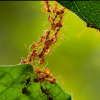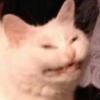 Hmmm, not sure I’d agree with that. I don’t think we know enough about ant’s dietary requirements to suggest they don’t need vitamins from fruits or other sources. If we know Camponotus sp seek out urine and bird feces to capture urea, what don’t we know about the 12,000 other species? I agree that our ants gain nutrients from live or fresh frozen feeders but I’d wager a species diet in the wild is vastly more varied and nutritious than anything we can concoct in captivity.
Hmmm, not sure I’d agree with that. I don’t think we know enough about ant’s dietary requirements to suggest they don’t need vitamins from fruits or other sources. If we know Camponotus sp seek out urine and bird feces to capture urea, what don’t we know about the 12,000 other species? I agree that our ants gain nutrients from live or fresh frozen feeders but I’d wager a species diet in the wild is vastly more varied and nutritious than anything we can concoct in captivity.
mate nobody feeds them with urea in captivity, they might be doing it because of a lack of resources in the wild that they get in the captivity(because they thrive without getting them). We don't really have to know about other 12000 species what type of urea with feces they prefer(lol), there is lots of ant keepers who have probably kept the sp. before you found them so you would already know what the species you caught prefer by other ant keepers experience with them(obviously not all the species because some are pretty rare to find ayk). We don't really have to guess what would like some c. pennsylvanicus would prefer. But it might be somewhat true about some undescribed or understudied species.
Members of this forum have speculated that the downfall of some captive Camponotus sp. colonies may have been due to lack of urea. Besides, as ANTdrew stated, people are feeding their colonies urea. Also, who are you to say that someone's colony is thriving without urea? For all we know if it was given urea, it could have been doing better. Furthermore, not all species require urea, it is just that Camponotus sp. have a symbiotic relationship with a certain species of bacteria. It isn't something that you can just push aside and say a colony is fine without it.
They literally do fine without it. Then, name me 1 species that will not make it without urea in captivity.
You do realize it is a whole genus, with thousands of species, and you have no scientific backing for your claim? The point is, they could be doing better if they had urea. Your first claim was also already proven wrong, as members do indeed feed their colonies urea. Some research regarding the topic:
"Various insects engage in microbial mutualisms in which the reciprocal benefits exceed the costs. Ants of the genus Camponotus benefit from nutrient supplementation by their mutualistic endosymbiotic bacteria, Blochmannia, but suffer a cost in tolerating and regulating the symbiont. This cost suggests that the ants face secondary consequences such as susceptibility to pathogenic infection and transmission. In order to elucidate the symbiont’s effects on development and disease defence, Blochmannia floridanus was reduced in colonies of Camponotus floridanus using antibiotics. Colonies with reduced symbiont levels exhibited workers of smaller body size, smaller colony size, and a lower major-to-minor worker caste ratio, indicating the symbiont’s crucial role in development. Moreover, these ants had decreased cuticular melanisation, yet higher resistance to the entomopathogen Metarhizium brunneum, suggesting that the symbiont reduces the ants’ ability to fight infection, despite the availability of melanin to aid in mounting an immune response. While the benefits of improved growth and development likely drive the mutualism, the symbiont imposes a critical trade-off. The ants’ increased susceptibility to infection exacerbates the danger of pathogen transmission, a significant risk given ants’ social lifestyle. Thus, the results warrant research into potential adaptations of the ants and pathogens that remedy and exploit the described disease vulnerability." (article: https://www.mdpi.com...450/9/2/58/htm).
So basically, the urea is beneficial to colony growth, but increases risk for infection.
Edited by Kaelwizard, March 5 2021 - 7:09 AM.





















